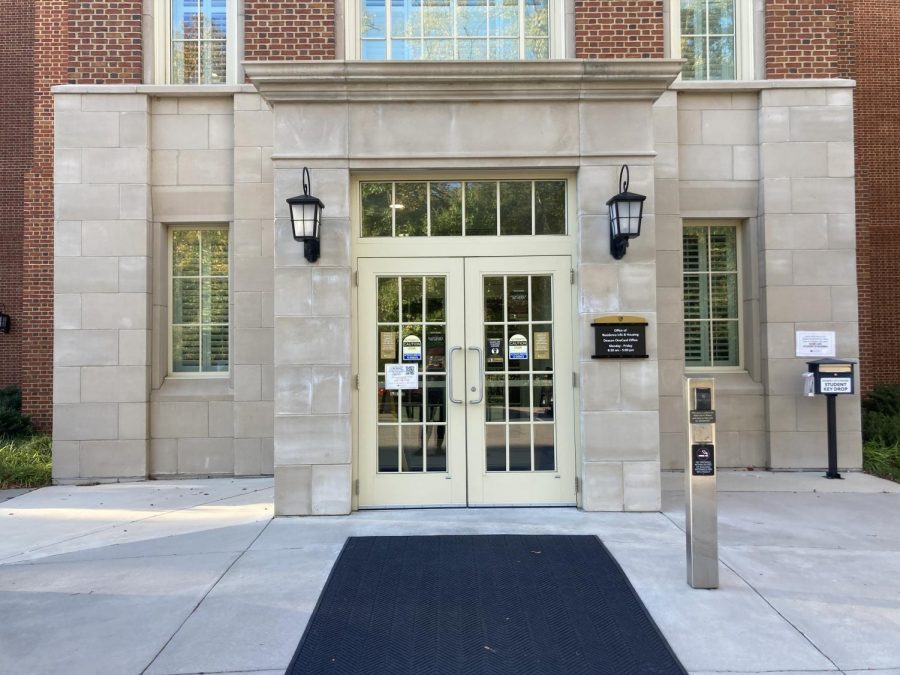Nowhere to go for Int’l students over break
Residence Life and Housing said it won’t provide dorm space for students over break
The Residence Life & Housing office is located in Angelou Hall.
October 28, 2021
On Oct. 4, the international student newsletter pinged into email inboxes right on time. At the bottom of the email — underneath visa reminders, Chinese movie night and volunteer opportunities — students uncovered shocking information:
Wake Forest will not provide housing for international students during the four-week winter break.
“I’m panicking,” Ruohan Li, a senior from Beijing, China, said. “I don’t have a specific plan for what I’m going to do or where I’m going to live during the winter.”
International students make up 9.2% of the undergraduate student body at Wake Forest, representing 46 different countries. Each country has its own travel regulations and quarantine periods during the continuing global pandemic. China requires a quarantine of at least 14 days in either a government-selected facility or hotel at the traveler’s own expense. Other countries, like Brazil, have opened their borders and lifted quarantine requirements for travelers.
These unpredictable conditions, which demand preplanning, highlight the difficulty for international students to travel internationally now.
“If I go back to my hometown, there is a quarantine policy and maybe I will have to be quarantined in the hotel for nearly a month.” Heng Zhang, a freshman from Beijing, said. He would need to return for the spring semester even before the quarantine period ends.
Another freshman, Qianyue Zhang (no relation), also from Beijing, is also not able to go back home because of the quarantine policy.
“The quarantine is a month, and winter break is only a month,” Qianyue Zhang said.
The decision by the school is largely financial, according to university officials. The policy lets the university cut costs in ways that are not possible during the school year.
“This period provides a necessary break for university staff and services,” said Zachary Blackmon, associate director of operations for Residence Life and Housing, “Additionally, the university is able to significantly reduce energy consumption during this period by setting buildings to operate at lower than usual heating setpoints.”
The university declined to report on how much it costs to run the facilities during winter break.
In the newsletter from early October, the International Student Scholar Services included a petition to remain on campus over break. Most students assumed this was the appeal process to live on campus during the break.
“I’m confused because I thought we can stay on campus during the winter break,” Qianyue Zhang said. “And I literally don’t know how to deal with that.”
Upon seeing the link, Li was optimistic the administration was going to help international students cope with the housing issue during the winter but was puzzled.
“So, I clicked it, but it was super weird, it just directed to nowhere,” Li said. “It directed me to the housing portal, but when I logged in, there was nothing. I just don’t know what to do.”
Li, out of concern, emailed Residence Life and Housing on Oct. 4, the day she saw the ISSS newsletter, but RLH did not reply until Oct. 13.
“Unfortunately, that was some misinformation,” Matt Clifford, the assistant vice president for campus life and dean of Residence Life and Housing, said. “Last year, we did use a request process. We are not using that process this year because we don’t have a hotel.”
Li was not satisfied with the response.
“They just said, ‘sorry, we won’t provide any winter housing for international students and we’re sorry for the inconvenience,’” Li said. “But actually, I wish they would provide more explanation.”
Failed petition link aside, many students were entirely unaware that housing would not be provided over the break.
“I didn’t notice the information,” Heng Zhang said. “It seems like our campus is not willing to provide the residency for us.”
Some students are willing to pay the school in order to counteract the added cost of keeping dorms functioning.
“If you really have financial problems this year, we could actually pay more just to remain here, because safety is a priority,” Li said.
Qianyue Zhang also stressed the concerns of safety, finance and transportation as important factors that should have been taken into account.
“Staying in a hotel or renting a house is not safe and not cheap,” she said. “And besides, we do not have cars, so that is another big issue. We cannot go anywhere, so we have to take Uber, which is also very expensive.”
Some international students can go home but are disappointed at the school for being what they called “ignorant” and “indifferent” to their COVID-19-related travel challenges.
“I’m very lucky that I can go back home,” Marina Velasco, a sophomore from Lima, Peru, said. “Honestly, the fact that the school isn’t even supporting us feels very isolating.”
A sense of ignorance and lack of compassion on behalf of the university is a feeling common among students.
“There are a lot of things and expenses that you have to take care of,” sophomore Emy Yamamoto, from Sao Paulo, Brazil, said. “Tell us to go back or have no place to go. It’s just very inconsiderate.”
Residence Life and Housing has reservations regarding leaving students on campus all break. They would not be able to house students together meaning most would be spread out on every end of campus.
“They certainly would be concerned about feeling lonely, but also being spread out,” Clifford said. “That’s not ideal for them.”
For many students, safety is actually the primary concern as they search for costly options to remain in Winston-Salem between semesters.
“Staying on campus is the safest and the most comfortable option for me,” Heng Zhang said. “Maybe I have to go to a hotel or other ways to find my residency, and I think it is time-consuming, and a little bit difficult for me.”
Still new to the United States, freshmen are concerned about their safety living alone. They “have never booked a hotel before in the United States,” and they are not sure if they can find “an appropriate Airbnb,” per Heng Zhang.
Wake Forest leased rooms in the Best Western Hotel last year to devote space for quarantine and isolation. Last winter break, Wake Forest used that space to house international students with individual rooms and basic facilities.
“Going into this year, knowing that we would have a highly vaccinated campus, we anticipated that the need for quarantine isolation would be much lower,” Clifford said. “So, we made the decision to discontinue the agreement with the hotel.”
This eliminated the option for international students to apply for winter-break housing in the hotel, as was the case last year.
Students can stay at the hotel for a “special rate” of just over $2,000 ($79 nightly) for the entire break. The money only covers the room, so international students have to pay extra for their transportation and meals. Last winter, students paid around $1,000 with meal plan options that they can choose to purchase.
“I keep telling people Wake Forest is my second home, and it’s just so sad when people here don’t really care about you,” Khushi Arya, a junior from New Delhi, India, said.
Arya continued: “The doors should be open, and they shouldn’t be able to just kick us out and say, ‘Well, good luck.’”
Although students are troubled by the situation, the ISSS noted they are cognizant of the feelings on campus and are working with Residence Life and Housing to address the issue.
The ISSS is monitoring results from an Oct. 22 survey to gauge the number of students affected. While ISSS can advocate for students based on the results, Residence and Life Housing has final say on the matter.














